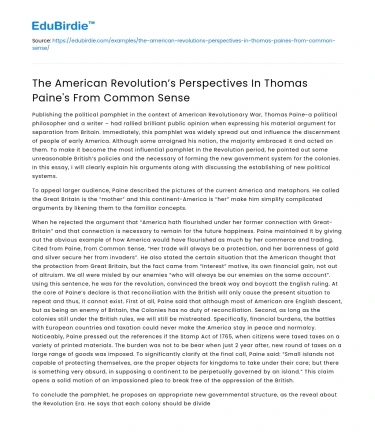Publishing the political pamphlet in the context of American Revolutionary War, Thomas Paine-a political philosopher and a writer – had rallied brilliant public opinion when expressing his material argument for separation from Britain. Immediately, this pamphlet was widely spread out and influence the discernment of people of early America. Although some arraigned his notion, the majority embraced it and acted on them. To make it become the most influential pamphlet in the Revolution period, he pointed out some unreasonable British’s policies and the necessary of forming the new government system for the colonies. In this essay, I will clearly explain his arguments along with discussing the establishing of new political systems.
To appeal larger audience, Paine described the pictures of the current America and metaphors. He called the Great Britain is the “mother” and this continent-America is “her” make him simplify complicated arguments by likening them to the familiar concepts.
Save your time!
We can take care of your essay
- Proper editing and formatting
- Free revision, title page, and bibliography
- Flexible prices and money-back guarantee
When he rejected the argument that “America hath flourished under her former connection with Great-Britain” and that connection is necessary to remain for the future happiness. Paine maintained it by giving out the obvious example of how America would have flourished as much by her commerce and trading. Cited from Paine, from Common Sense, “Her trade will always be a protection, and her barrenness of gold and silver secure her from invaders”. He also stated the certain situation that the American thought that the protection from Great Britain, but the fact came from “interest” motive, its own financial gain, not out of altruism. We all were misled by our enemies “who will always be our enemies on the same account”. Using this sentence, he was for the revolution, convinced the break way and boycott the English ruling. At the core of Paine’s declare is that reconciliation with the British will only cause the present situation to repeat and thus, it cannot exist. First of all, Paine said that although most of American are English descent, but as being an enemy of Britain, the Colonies has no duty of reconciliation. Second, as long as the colonies still under the British rules, we will still be mistreated. Specifically, financial burdens, the battles with European countries and taxation could never make the America stay in peace and normalcy. Noticeably, Paine pressed out the references if the Stamp Act of 1765, when citizens were taxed taxes on a variety of printed materials. The burden was not to be bear when just 2 year after, new round of taxes on a large range of goods was imposed. To significantly clarify at the final call, Paine said: “Small islands not capable of protecting themselves, are the proper objects for kingdoms to take under their care; but there is something very absurd, in supposing a continent to be perpetually governed by an island.” This claim opens a solid motion of an impassioned plea to break free of the oppression of the British.
To conclude the pamphlet, he proposes an appropriate new governmental structure, as the reveal about the Revolution Era. He says that each colony should be divided into districts, and each colony ought to send delegates to Congress. He also offers a way of choosing congress and president. The president will be chosen from one specific colony, and in the next election, a different colony will be chosen. As what he does, the colonies system created by Paine has enormous space on a national scale to engage in any action such as enact fundamental laws and huge power, less democratic when giving less power per capital to those states with density population. The valuable suggestion about the new political structure appeared, dismissing the arguments for reconciliation. As said by Watson in Building the American Republic, “As Paine’s arguments sank in, one assembly after another instructed its delegates to vote for separation. Congress finally adopted Thomas Jerson’s Declaration of Independence on July 4, 1776. The Declaration’s fervent language has inspired and challenged Americans ever since.” The independence of America is legitimated, open the era of new American Revolution and Construction.






 Stuck on your essay?
Stuck on your essay?

